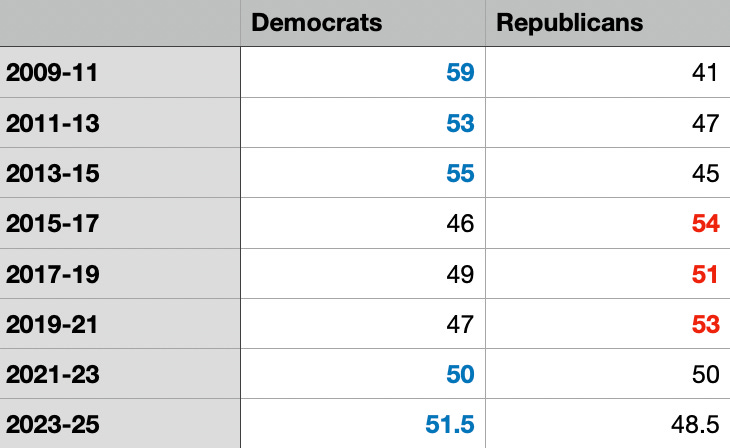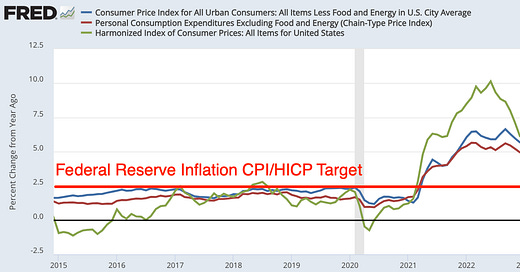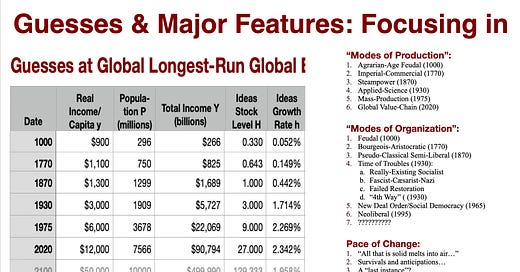
Discover more from Brad DeLong's Grasping Reality
FOCUS: Mitch McConnell as Republican Leader:
Consider that so far in this century the concentration of democrats in large population states has meant that a 50-50 nation would generate a Senate that woul have a 56-44 Republican majority.
Consider that in 2009, Mitch McConnell and his Republican Senate leader laid down the law: we are going to do no legislating, but instead be as obstructionist as possible to underline partisan differences. It is true, he told his supporters in the Senate, that such obstructionism means that for the next two years you will have no job—you will find that you might as well have been a potted plant. But afterwards, after we have focused Americans attention on how important the partisan differences are, we will have a durable majority, and will be able to do our jobs and succeed in changing America into what we want it to be.
How has that been working out for him? Well:
NOTE: For 23-25, not 51.5 but rather 50.5
Republicans will have held the Senate majority for only 6 out of 16 years. And they will never have managed to obtain the 56-seat majority that simply turning down the heat and expecting people will simply fill in their customary box on the ballot would have produced.
Moreover, what did McConnell get from his six years as Majority Leader? A lot of nut-boy and -girl judges appointed, yes. And a pointless upper-class tax cut that did nothing to encourage economic growth or investment in America, and that raised a lot of money by taxing Republican worthies via reduction in the SALT deduction.
Why have the results for McConnell been so extraordinarily subpar? On those very rare occasions when he speaks, he says things like "candidate quality”. But what has led Republican primary electorates and Republican moneymen to choose low-quality candidates? The answer is this: when you turn up the partisan heat to 11, you make a political environment uncongenial for dealmakers and very convenient for grifters and for the unhinged. Had McConnell turn down the partisan hea—encouraged the 20 left-most members of his caucus to make deals and legislate where there was legislation to be done—he would, I think, I have spent not six but twelve of the sixteen years covered in the table above as majority leader.
Moreover, now he has created a Senate in which the right-most members of the Democratic Party are willing to vote for policies far to the left of those they are comfortable with just to stick it to McConnell.
And the Washington press corps portrays this as a successful stint as Republican leader?
One Video:
TPM Newsmaker: Breaking Down the Midterms with Simon Rosenberg and Tom Bonier: Democratic strategists Simon Rosenberg and Tom Bonier were the two most prominent voices telling us for weeks that the 2022 Red Wave was a mirage. They were right. Yesterday afternoon Rosenberg and Bonier joined us for a live TPM Newsmaker briefing to discuss just what they saw in the polls and early voting patterns that allowed them to see what others missed:
Oþer Things Þt Went Whizzing by…
Very Briefly Noted:
Alex Barinka: Meta Investors Are in No Mood for Zuckerberg’s Metaverse Moonshot: ‘Zuckerberg has defended the spending. “The future doesn’t just happen,” he said at an October product launch…
NIH Llamas: ‘ME: I want to start a financial services and investment company based on cryptocurrency, which fixes all of the terrible problems with fiat money. INVESTORS: So what do you want from us? ME: Half a billion US dollars of fiat money, which I do not support…
Adam Fisher: Sam Bankman-Fried Has a Savior Complex—And Maybe You Should Too…
Michael Strain: The Republicans Lose with Trump: ‘The absence of the anticipated Republican “red wave” in the US midterm elections may be the moment when the party finally realizes that former President Donald Trump is an electoral liability. Enduring political success is built on a foundation of sound, effective policies that improve voters' lives and economic prospects…
William Janeway: The Rise and Fall of the Socially Beneficial Corporation: ‘The rise of the neoliberal order in the 1970s and 1980s coincided with the demise of the socially beneficial corporation. Since then, the US federal government and other institutions have managed to offset the loss of only part of the broader contributions that big business once made…
Addison del Maestro: Suburbia and Paranoia: ‘One of the things I think about, looking forward to owning a house one day, is whether I will become one of those people who wonders why anybody is out walking. “What are they up to?” “Should we call the police?” I can laugh at that now, but I wonder how much I will have to resist those attitudes which the suburban lifestyle seems in some way to trigger…
The Editorial Board: The drone war in Ukraine…
Venkatesh Rao: The Muskening: ‘Musk and the society of hive-minds that is Twitter have gotten into each other’s OODA loops, leading to a kind of mutual collapse. Like two heavyweight boxers knocking each other out simultaneously…. I call this situation the Muskening. Where every day is International Own Goal Day…
Clan Twomey: ‘Fair to say not many TDs besides @Paschald will read the latest book by @delong, never mind review it so cogently: Paschal Donohoe: "The pitfalls that beset progress: James Bradford DeLong presents a magnificent if slightly frustrating and occasionally drawn-out reflection on the history of our global economy…
David Gerard: Welcome to Twitter, Mr. Musk! Here’s your accordion…
Will MacAskill: ‘My thoughts and feelings about the actions that led to FTX’s bankruptcy, and the enormous harm that was caused as a result…
¶s
Tom Hancock: Xi Starts Third Term Facing a Bitter Intellectual War: ‘The public debate among senior economists centers on the merits of a return to a Mao Zedong-inspired “people’s economy.” It’s witnessed otherwise-mundane news items about rural cooperatives and public canteens, features of the Mao-era economy, suddenly going viral online. The debate underlines a widespread uncertainty in China about where the nation is headed under Xi. And that itself is a drag on an economy already in the doldrums due to the pandemic and a housing slump…. One universal feature of China’s intellectual war is that everyone seems to feel like a victim. The tone of economists like Jia Kang suggests they feel somewhat under siege, while a response to the agricultural cooperatives debate posted on Utopia suggested the left feels defeated, too…
The Economist: [William Magnuson’ “For Profit” offers thrilling tales of commercial endeavour: ‘Corporations often start out with the public good in mind. It doesn’t last…. For much of corporate history, serving society was part of their charter. Rome’s publicani, or publicans, were government contractors…. Over time, charters have gone, but corporations still bear the public good in mind—in some cases at least as much as profit. Henry Ford wanted to create low-priced cars made by highly paid workers.… He draws sensible conclusions from this. Corporations cannot hope to put public interest above all else for long; what the public wants is far too complicated for them to fathom…
Steve Schmidt: American politics remains broken: ‘American politics was broken before the Tuesday election. It remained broken on Wednesday morning…. Herschel Walker’s candidacy is the living embodiment of George Washington’s farewell warning. Most of these extremist candidates were very narrowly defeated. It was razor thin. This line will not hold forever. It is an astonishment to see Democrats claim credit for a great victory over the extremists who are fueled by their condescension, incompetence and ideological obtuseness. Instead of boastfulness, this should be an occasion for the deepest humility and gratitude that the “red wave” did not materialize. That it didn’t is the result of the wisdom of the American people, not the genius of the Biden White House…
Lucrezia Reichlin: Meloni’s Choice: ‘The adoption of an anti-EU stance by Italy's government would threaten the future of the European project by undercutting efforts to advance the institutional reforms that are needed to support further integration. And such integration is essential to enable Europe to confront the biggest challenges facing its citizens.… Without a shared vision, the EU will remain inherently unstable. But formulating such a vision, as Macron is attempting to do, takes work, such as forging consensus on thorny questions and implementing difficult governance reforms. Acting as a spoiler is much easier: simply thwart progress, and the edifice’s collapse will practically take care of itself. This – not another fiscal crisis – is the real danger posed by Meloni’s government.




















"The rise of the neoliberal order in the 1970s and 1980s coincided with the demise of the socially beneficial corporation."
I think the diminishing threat of Communism as an economic threat meant high income owners had less incentive to "play nice" as employers and to sic their political lackeys to play rougher.
Was there (is there) a Pigou subsidy that would have internalized the positive externality of Bell Labs- like activities? Centralizing basic research in the federal government has some downsides.
But this presumes that McConnell in fact wanted to achieve something beyond a 6-3 SCOUS and transferring income to upper income tax (non) payers and running up the deficit to try to scare Democrats into reducing transfer payment to low income people. Not impeaching Trump was a strategic mistake.